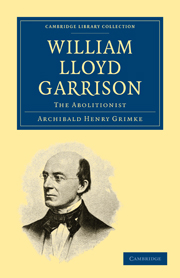Book contents
- Frontmatter
- Preface
- Contents
- CHAPTER I The Father of the Man
- CHAPTER II The Man Hears a Voice: Samuel, Samuel!
- CHAPTER III The Man Begins his Ministry
- CHAPTER IV The Hour and the Man
- CHAPTER V The Day of Small Things
- CHAPTER VI The Heavy World is Moved
- CHAPTER VII Master Strokes
- CHAPTER VIII Colorphobia
- CHAPTER IX Agitation and Repression
- CHAPTER X Between the Acts
- CHAPTER XI Mischief Let Loose
- CHAPTER XII Flotsam and Jetsam
- CHAPTER XIII The Barometer Continues to Fall
- CHAPTER XIV Brotherly Love Fails, and Ideas Abound
- CHAPTER XV Random Shots
- CHAPTER XVI The Pioneer Makes a New and Startling Departure
- CHAPTER XVII As in a Looking Glass
- CHAPTER XVIII The Turning of a Long Lane
- CHAPTER XIX Face to Face
- CHAPTER XX The Death-Grapple
- CHAPTER XXI The Last
- Index
CHAPTER VIII - Colorphobia
Published online by Cambridge University Press: 05 February 2012
- Frontmatter
- Preface
- Contents
- CHAPTER I The Father of the Man
- CHAPTER II The Man Hears a Voice: Samuel, Samuel!
- CHAPTER III The Man Begins his Ministry
- CHAPTER IV The Hour and the Man
- CHAPTER V The Day of Small Things
- CHAPTER VI The Heavy World is Moved
- CHAPTER VII Master Strokes
- CHAPTER VIII Colorphobia
- CHAPTER IX Agitation and Repression
- CHAPTER X Between the Acts
- CHAPTER XI Mischief Let Loose
- CHAPTER XII Flotsam and Jetsam
- CHAPTER XIII The Barometer Continues to Fall
- CHAPTER XIV Brotherly Love Fails, and Ideas Abound
- CHAPTER XV Random Shots
- CHAPTER XVI The Pioneer Makes a New and Startling Departure
- CHAPTER XVII As in a Looking Glass
- CHAPTER XVIII The Turning of a Long Lane
- CHAPTER XIX Face to Face
- CHAPTER XX The Death-Grapple
- CHAPTER XXI The Last
- Index
Summary
Garrison's Abolitionism was of the most radical character. It went the whole length of the humanity of the colored race, and all that that implied. They were, the meanest members, whether bond or free, his brothers and his sisters. From the first he regarded them as bone of his bone and blood of his blood, as children with him of a common father. Poor and enslaved and despised to be sure, wronged by all men, and contemned by all men, but for that very reason they were deserving of his most devoted love and labor. He never looked down upon them as wanting in any essential respect the manhood which was his. They were men and as such entitled to immediate emancipation. They were besides entitled to equality of civil and political rights in the republic, entitled to equality and fraternity in the church, equality and fraternity at the North, equality and fraternity always and everywhere. This is what he preached, this is what he practiced. In not a single particular was he ever found separating himself from his brother in black, saying to him “thus far but no farther.” He never drew the line in public or private between him and the people whose cause was his cause—not even socially. He went into their homes and was in all things one with them. He forgot that he was white, forgot that they were black, forgot the pride of race, forgot the stigma of race too in the tie of human kinship which bound him to them.
- Type
- Chapter
- Information
- William Lloyd GarrisonThe Abolitionist, pp. 157 - 169Publisher: Cambridge University PressPrint publication year: 2010First published in: 1891



